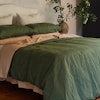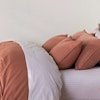The Cushion Lab
Ergonomic memory foam pillows and bedding essentials

The Cushion Lab's Sustainability Rating
Acceptable
Raw Materials
Cushion Lab uses majority high impact materials, including synthetic foams, nylon, polyester, and spandex. It does use some low impact materials, including organic cotton and recycled polyester. It had a goal to increase its use of recycled materials, but it does not appear on track to meet this goal.
Energy Use & Production
Commons could not find information related to renewable energy or energy efficiency measures.
Packaging & Distribution
Cushion Lab has made efforts to reduce the amount of virgin plastic in its packaging by incorporating recycled materials. It minimizes its packaging by condensing its cushions so that they require smaller boxes. The brand has a goal to reduce the amount of air freight used in shipping, but it has not reported specific progress against this goal.
Repair & Care
Cushion Lab does not offer repair services or support. Cushion Lab offers a 1 year warranty. It gives detailed and environmentally conscious care instructions for its products.
Take Back Programs
Commons could not find information on any take back programs.
Slow Fashion
Cushion Lab offers a core evergreen collection, but also has frequent new releases and limited editions.
Marketing
Commons is still analyzing this brand's marketing emails.
Transparency & Reporting
Cushion Lab reports sustainability informatiion, including emissions measurement and emissions reduction, via the Change Climate Project. This page is updated annually.
Emissions Tracking
Cushion Lab is certified Climate Neutral by the Change Climate Project. It has internally measured and publicly reports its company-level emissions, including a breakdown by scope. In 2023 its estimated emissions footprint was 671 tCO2e.
Emissions Targets
Cushion Lab has a medium-term emissions reduction target for its Scope 1 and 2 emissions only. It has not reported progress against this goal. It also has committed to specific emissions reduction actions, including reducing air freight and increasing use of recycled materials. It offsets its full value chain emissions with vetted offset projects.
Supply Chain & Labor
Cushion Lab does not publish information about its supply chain partners. It does not have or do not make public any supplier code of conduct.
Where Cushion Lab is doing well: Cushion Lab publicly reports on its emissions tracking and reduction goals. It uses some recycled materials in its packaging.
Where Cushion Lab has room to grow: Cushion Lab is still reliant on high emissions, fossil-fuel based synthetic materials. It could share more specific information about its energy strategy, supply chain, and labor practices.
Our ratings are based on a scale from 1 (bad) to 5 (best). How we rate →
https://explore.changeclimate.org/brand/the-cushion-lab
https://thecushionlab.com/pages/faqs?srsltid=AfmBOopa-X8xA4Dym5nnQXT1PRQ3pjRQZ2Np2hg6K9chNH5k783hIdEc
https://thecushionlab.com/pages/our-impact
https://thecushionlab.com/pages/our-impact?srsltid=AfmBOopYjwpkfiRVyn37WJAD8K3kGtv6MizoJ5edaFbqW0K10fBPb7_-
Get Rewards
Earn for sustainable purchases
Commons rewards you for sustainable purchases from all our Top Rated brands, plus thousands of everyday purchases — from thrift stores to public transit.
Learn more about rewards ->








